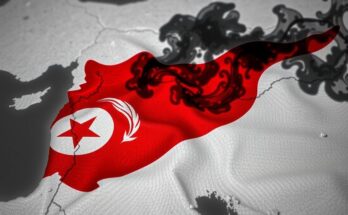Southeast Asian leaders convened in Laos for an ASEAN summit on October 9, 2024, focusing on the civil war in Myanmar and tensions in the South China Sea. The summit includes discussions with major powers like the U.S. and China and highlights leadership changes in ASEAN nations. Myanmar’s humanitarian crisis poses a severe challenge to ASEAN’s credibility as it convenes to address escalating regional conflicts and geopolitical dynamics.
Southeast Asian leaders convened in Vientiane, Laos, on October 9, 2024, for an annual summit that primarily aims to address two significant regional challenges: the ongoing civil war in Myanmar and the escalating territorial disputes in the South China Sea. The Association of Southeast Asian Nations (ASEAN) summit is scheduled to include discussions with major global powers such as China, the United States, and Russia, which are vying for influence within the region. The summit’s agenda is expected to touch upon the recent surge of violence in the Middle East, albeit Southeast Asia has thus far experienced only indirect impacts. Historically, ASEAN’s capabilities to exert influence have been limited, even among its own member states; nevertheless, it often facilitates dialogue among superpowers interested in the Southeast Asian region. The ten ASEAN member states—Indonesia, Thailand, Singapore, the Philippines, Vietnam, Malaysia, Myanmar, Cambodia, Brunei, and Laos—will also engage in conversations with dialogue partners, which include Japan, South Korea, India, and Australia, on a variety of topics encompassing economic cooperation, climate change, and energy security. During his opening remarks, Lao Prime Minister Sonexay Siphandone acknowledged the new leadership in Thailand and Singapore, expressing Laos’ aspiration to foster collaboration among member states to navigate geopolitical and economic challenges during its term as chair. “We help one another, and work together the ASEAN way,” he affirmed, emphasizing the importance of unity within the bloc. Thailand is now represented by the youngest ASEAN leader, Prime Minister Paetongtarn Shinawatra, while Singapore’s Prime Minister Lawrence Wong stepped into his role earlier this year following the departure of Lee Hsien Loong. Vietnam is represented at the summit by Prime Minister Pham Minh Chinh due to the recent leadership change; however, President Joko Widodo of Indonesia is notably absent, delegating Vice President Ma’ruf Amin to represent him. In terms of international representation, U.S. Secretary of State Antony Blinken will substitute for President Joe Biden, alongside Chinese Premier Li Qiang. Relations between the U.S. and China, particularly concerning Beijing’s assertive actions in the contested South China Sea, are anticipated to be a prominent topic of discussion. “A number of (China)-related issues are likely to come up in the context of the ASEAN meetings,” stated Dan Kritenbrink, the top U.S. diplomat for Asia, highlighting the critical nature of this dialogue. ASEAN members, such as Vietnam, the Philippines, Malaysia, and Brunei, along with Taiwan, share overlapping territorial claims with China, which has aggressively sought to solidify its control over the South China Sea. Negotiations for a code of conduct to regulate behavior in the region have progressed slowly, with incidents between Chinese and Philippine vessels occurring repeatedly this year, exacerbating tensions. Muhammad Faizal Abdul Rahman from Singapore’s S. Rajaratnam School of International Studies noted that the preference for conflict avoidance among member states raises doubts about the likelihood of significant outcomes from the summit. “In reality, national interests matter more than regional interests,” he pointed out. The Myanmar crisis also looms large over the ASEAN discussions, as the region grapples with the humanitarian fallout from the military’s ousting of the elected government in February 2021, resulting in nearly 6,000 fatalities and over three million displaced individuals. Although Myanmar’s junta has nominally agreed to an ASEAN peace plan, effective implementation remains elusive amid ongoing violence with pro-democracy forces. Thailand is set to host an informal consultation regarding the Myanmar situation in December, though attendance from Myanmar’s side remains uncertain. This summit marks Myanmar’s first representation since ASEAN barred political leaders from participating, yet critics argue that the inclusion of a senior diplomat could signal ASEAN’s diminishing resolve in addressing the crisis. In closing, it is clear that ASEAN’s discussions are pivotal as leaders from across Southeast Asia confront pressing regional issues, balancing individual state interests with collective outcomes in a complex international landscape.
The ASEAN summit serves as a crucial forum for Southeast Asian nations to collaboratively address regional challenges, particularly the civil unrest in Myanmar and escalating tensions in the South China Sea. The bloc, composed of ten member states, has historically faced difficulties in asserting influence and unity. The summit also provides an opportunity for member states to engage with global powers vying for regional influence, particularly amid rising geopolitical tensions. The summit comes at a time of significant leadership changes within several ASEAN nations, prompting discussions on cooperation under Laos’ chairmanship.
The ASEAN summit represents a critical juncture for Southeast Asia as leaders strive to address urgent regional challenges, including the Myanmar crisis and South China Sea disputes. The ongoing humanitarian situation in Myanmar continues to test ASEAN’s credibility, compounded by complex dynamics with China in territorial matters. As global powers compete for influence in the region, the ability of ASEAN member states to unite and prioritize regional cooperation remains paramount. However, conflicting national interests pose significant obstacles to achieving substantial resolutions during the summit.
Original Source: www.thehindu.com




